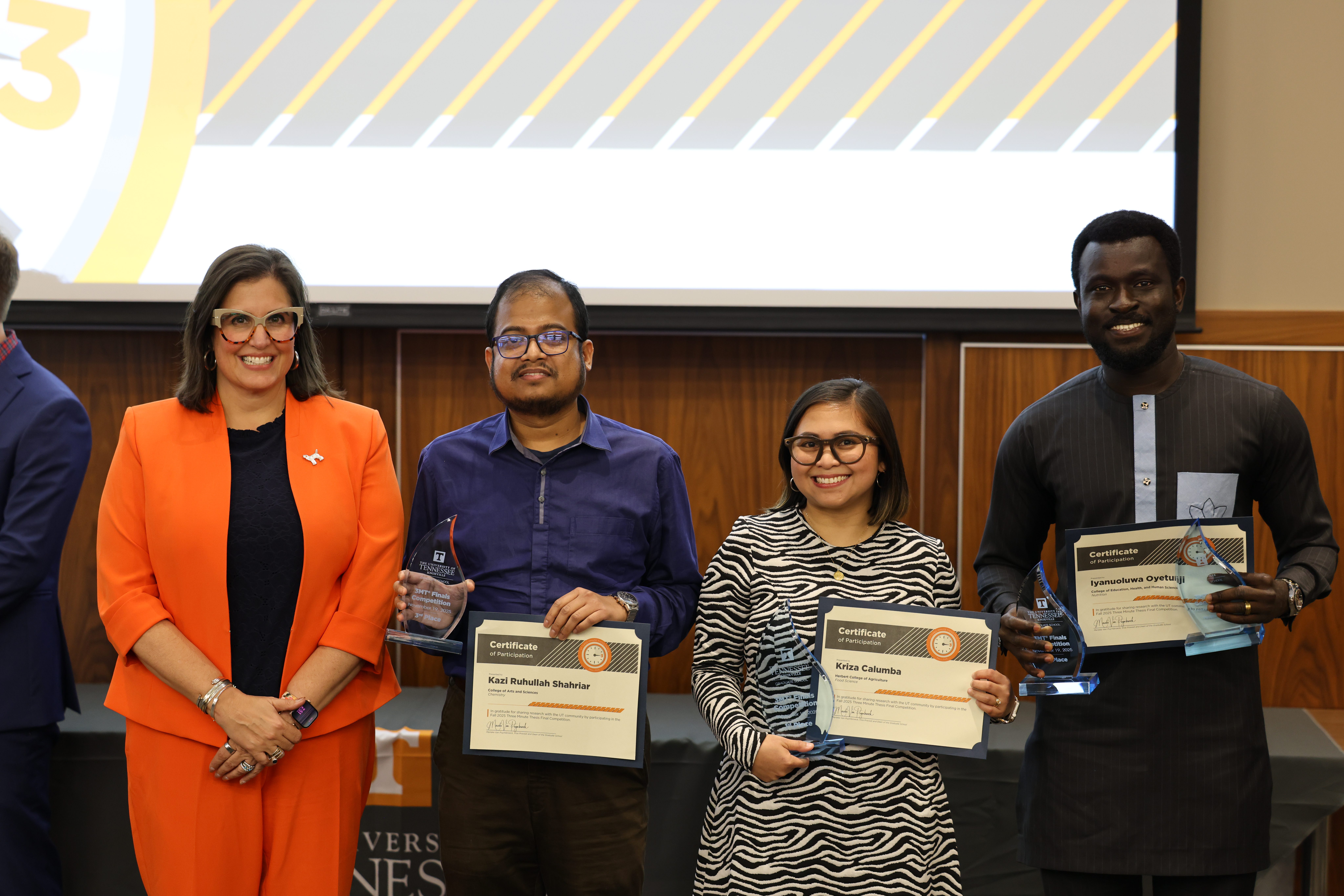
Food science graduate student Kriza Calumba (third from left) after winning the Three Minute Thesis final, pictured with Vice Provost and Dean of the Graduate School Marieke Van Puymbroeck (far left) and fellow presenters. Photo courtesy of the Graduate School.
Food science doctoral student Kriza Calumba won the University of Tennessee’s 2025 Three Minute Thesis (3MT®) competition from among seventeen graduate student finalists. Winning the finals means Calumba will represent UT Knoxville in the regional 3MT competition February 18-20, 2026, in Baton Rouge, Louisiana.
The 3MT is a research communication competition widely adopted at universities such as UT Knoxville, challenging master’s and doctoral students to present their often highly technical thesis or dissertation topic to a lay audience in just three minutes.
Calumba said, “The 3MT competition has been one of the highlights of my PhD experience at UT. I’m truly grateful for the opportunity to participate—and even more grateful to have won.”
From Davao City, Philippines, Calumba’s journey to the Herbert College of Agriculture started after she earned her bachelor’s degree in food technology in the Philippines. She pursued her master’s degree in food science at Louisiana State University on a Fulbright scholarship, but first learned about UT’s Department of Food Science at a Fulbright event in the Philippines. She then encountered Qixin Zhong’s work in food ingredient science and technology, and the rest is history!
Calumba always wanted to enter the 3MT competition. She said, “The 3MT competition felt like a great opportunity to challenge myself and try something new.” As a student concentrating in microbiology, Calumba presented her dissertation on shellac-based encapsulation for probiotics—beneficial live bacteria. Her presentation evolved between the preliminary and final rounds after she received helpful feedback from Sean Hendricks and Abby Sherman from the Graduate School
One of her favorite parts of the competition was listening to other presentations. “It reminded me how important it is for us to be able to communicate our research to a lay audience, which is the core purpose of the 3MT,” she said. As someone who has presented to several non-specialist groups through seminars and lectures, Calumba understands the importance of developing these communication skills.
The most challenging part of the competition for Calumba was explaining her scientific methods in a way the audience could understand—likely the most difficult aspect of the competition for most competitors. She found it rewarding to see the audience engage with her presentation and listen intently, which affirmed that her efforts had paid off.
Several members of the Department of Food Science helped prepare Calumba and the other competitors. Professor Toni Wang sent the 3MT announcement to food science graduate students and encouraged them to apply. Zhong supported Calumba’s entry and gave her the confidence to pursue it. She said, “The encouragement from the food science department overall helped us feel ready.”
In addition to Calumba, food science students Bingqi Chen and Ploy Wong competed in the 3MT competition—showing outstanding representation from the department. “Having three food science students advance to the finals speaks to the strength of our program,” Calumba said. “It reflects the quality and relevance of the research we’re doing, but also the commitment of the students to develop strong communication skills and share our work with a lay audience.”
Calumba will graduate from her doctoral program in spring 2026. She hopes to pursue a career in academia with a focus on probiotic research and functional foods. Her work as a PhD student helps her gain the technical expertise and soft skills needed for that path. She said, “This research also gives me the platform to share evidence-based information about probiotics not only within the academic community, but also with the food industry and the general public.”
The Herbert College of Agriculture values students like Calumba, who proudly represent its programs across campus and aspire to academic and research careers dedicated to improving food quality.
